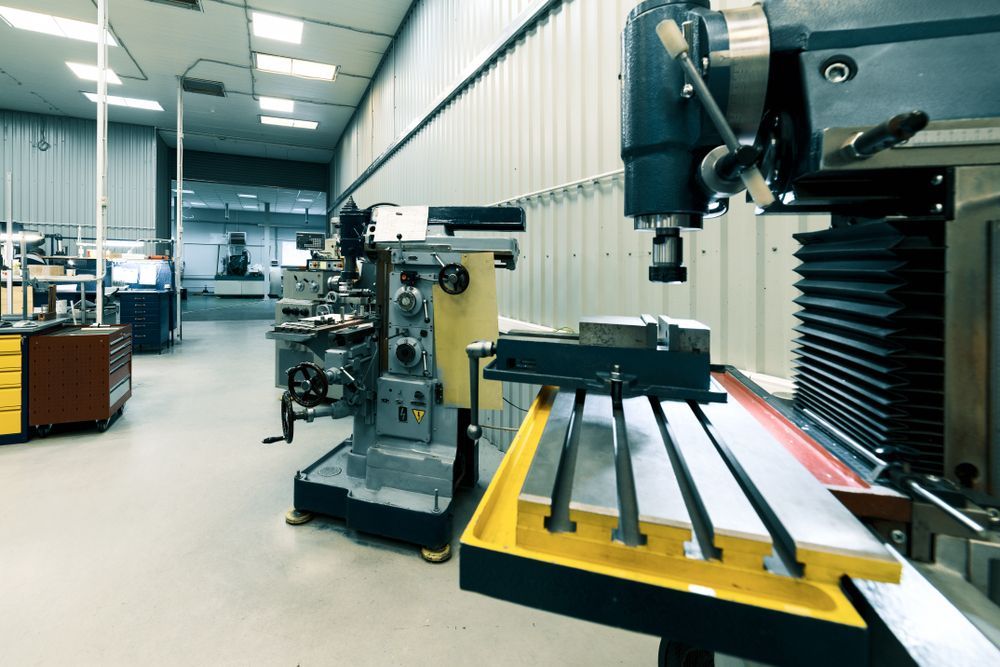Industrial Insurance in California
Index
Understanding Industrial Insurance
Industrial Insurance Laws in California
Types of Industrial Insurance Coverage in California
Cost of Industrial Insurance in California
Choosing the Right Industrial Insurance Provider
Contact Us
Phone
886-226-4436
Location
9340 Bolsa Ave, Westminster, CA 92683
Industrial insurance is an essential aspect of doing business in California. Understanding the ins and outs of this type of insurance is crucial for both business owners and employees. In this article, we will explore the definition, importance, key features, laws, types of coverage, cost, and choosing the right industrial insurance provider.
Understanding Industrial Insurance
Definition and Importance of Industrial Insurance
Industrial insurance, also known as commercial insurance, is a type of coverage that protects businesses and their employees from various risks and liabilities associated with their industry. It provides financial assistance in the event of property damage, liability claims, and workplace injuries.
This insurance is especially important in California, where stringent laws and regulations exist to ensure the safety of workers and the welfare of businesses. Failing to have adequate industrial insurance can result in heavy penalties and legal consequences.
When it comes to industrial insurance, it's crucial to understand the key features and coverage areas it offers. By having a comprehensive understanding of these features, businesses can make informed decisions about their insurance needs and ensure they are adequately protected.
Key Features of Industrial Insurance
Industrial insurance policies typically cover three main areas: workers' compensation insurance, liability insurance, and property insurance. Let's take a closer look at each:
Workers' Compensation Insurance
Workers' compensation insurance is a fundamental component of industrial insurance. It provides coverage for medical expenses, lost wages, and rehabilitation costs for employees who suffer work-related injuries or illnesses. This coverage not only protects employees but also safeguards businesses from potential lawsuits and financial burdens resulting from workplace accidents.
Under California law, employers are required to provide workers' compensation insurance for their employees. This ensures that injured workers receive the necessary medical care and financial support while protecting businesses from costly legal battles.
Liability Insurance
Liability insurance is another crucial aspect of industrial insurance. It protects businesses from claims and lawsuits filed by third parties, such as customers, clients, or vendors, for bodily injury or property damage caused by the business's operations or products. This coverage helps businesses cover legal fees, settlements, and judgments, ensuring their financial stability in the face of unexpected liabilities.
In California, liability insurance is particularly important due to the state's strict liability laws. These laws hold businesses responsible for injuries or damages caused by their products or activities, even if they were not directly at fault. Having adequate liability insurance is essential for businesses to protect their assets and reputation.
Property Insurance
Property insurance is designed to protect businesses from financial losses resulting from damage or loss of their physical assets, such as buildings, equipment, inventory, and furniture. It provides coverage for events like fire, theft, vandalism, or natural disasters, ensuring that businesses can recover and rebuild without facing significant financial setbacks.
In California, where wildfires and earthquakes are common, property insurance is of utmost importance. These natural disasters can cause extensive damage to businesses, leading to substantial financial losses. Having comprehensive property insurance coverage is crucial for businesses to mitigate these risks and ensure their long-term sustainability.
By understanding the key features of industrial insurance,
businesses can assess their specific needs and choose policies that provide comprehensive coverage. It's essential to work with experienced insurance professionals who can guide businesses through the process of selecting the right insurance policies and ensure they have adequate protection in place.
Industrial Insurance Laws in California
Overview of California's Industrial Insurance Regulations
California has specific regulations in place to govern industrial insurance. These regulations aim to protect both employees and employers. Business owners must understand these regulations to ensure compliance and minimize risks.
One of the key aspects of California's industrial insurance regulations is the requirement for businesses to maintain a safe work environment. This includes implementing safety protocols, providing necessary safety equipment, and regularly inspecting the workplace for potential hazards. By prioritizing workplace safety, businesses can reduce the risk of accidents and injuries, which in turn can help lower insurance premiums.
In addition to maintaining a safe work environment, businesses in California are also required to keep accurate records related to industrial insurance. This includes documenting any workplace incidents, injuries, and near misses. By keeping detailed records, businesses can demonstrate their commitment to safety and provide necessary documentation in the event of an insurance claim or audit.
Furthermore, California's industrial insurance regulations emphasize the importance of providing necessary training to employees. Businesses are responsible for ensuring that their employees receive proper training on workplace safety procedures, the proper use of equipment, and any specific hazards associated with their job roles. This training not only helps prevent accidents and injuries but also ensures that employees are aware of their rights and responsibilities when it comes to industrial insurance.
Compliance Requirements for Businesses
Businesses in California must adhere to certain compliance requirements to maintain their industrial insurance coverage. These requirements include maintaining a safe work environment, keeping accurate records, and providing necessary training to employees.
Another important compliance requirement for businesses in California is the need to carry workers' compensation insurance. This type of insurance provides coverage for employees who suffer work-related injuries or illnesses. It is mandatory for most employers in California to have workers' compensation insurance, and failure to comply can result in severe penalties and legal consequences.
Moreover, businesses must also ensure that they are properly classifying their employees for insurance purposes. California uses a classification system to determine the appropriate insurance rates for different job roles. It is crucial for businesses to accurately classify their employees to avoid potential legal issues and ensure that they are paying the correct insurance premiums.
Additionally, businesses are required to report any workplace injuries or illnesses to their insurance carrier promptly. This reporting helps initiate the claims process and ensures that employees receive the necessary medical treatment and benefits in a timely manner. Failing to report workplace incidents can lead to delays in compensation and potential legal complications.
In conclusion, compliance with California's industrial insurance regulations is essential for businesses to protect both their employees and themselves. By maintaining a safe work environment, keeping accurate records, providing necessary training, carrying workers' compensation insurance, and properly classifying employees, businesses can ensure compliance and minimize risks. Understanding and adhering to these regulations not only helps businesses avoid penalties and legal consequences but also fosters a culture of safety and well-being in the workplace.
Types of Industrial Insurance Coverage in California
When it comes to protecting your business in California, having the right insurance coverage is crucial. There are several types of industrial insurance coverage available to businesses in the state, each serving a specific purpose and providing essential protection. Let's take a closer look at some of the most common types of industrial insurance coverage in California.
Workers' Compensation Insurance
One of the most important types of insurance coverage for businesses in California is workers' compensation insurance. This coverage is not only important, but it is also mandatory for businesses operating in the state. Workers' compensation insurance provides benefits to employees who suffer work-related injuries or illnesses.
With workers' compensation insurance, employees are protected in the event of an accident or injury that occurs on the job. This coverage includes medical expenses, disability benefits, and wage replacement. It ensures that employees receive the necessary medical treatment and financial support they need to recover and get back to work.
Liability Insurance
Another essential type of industrial insurance coverage in California is liability insurance. Liability insurance protects businesses from claims made by third parties for property damage, bodily injury, or negligence. It provides financial protection and covers the costs of legal defense and any settlements or judgments resulting from these claims.
Having liability insurance is crucial for businesses, as it helps protect them from potential lawsuits and financial losses. Whether it's a customer slipping and falling on your premises or a product malfunctioning and causing harm, liability insurance provides the necessary coverage to handle these situations. It gives businesses peace of mind knowing that they are protected against unforeseen incidents that could potentially bankrupt their operations.
Property Insurance
Property insurance is another vital type of industrial insurance coverage that businesses in California should consider. This coverage is designed to protect a business's physical assets, including buildings, equipment, inventory, and furniture. It provides financial compensation to repair or replace these items in the event of a covered loss, such as fire, theft, or natural disaster.
Having property insurance is essential for businesses, as it safeguards their physical assets from unexpected events that could cause significant financial losses. Whether it's a fire that damages your office space or a break-in that results in stolen equipment, property insurance ensures that you can recover and continue your operations without bearing the full financial burden of the loss.
In conclusion, having the right insurance coverage is crucial for businesses in California. Workers' compensation insurance, liability insurance, and property insurance are just a few examples of the types of industrial insurance coverage available. By investing in these coverages, businesses can protect themselves from potential financial losses and ensure the continuity of their operations.
Cost of Industrial Insurance in California
When it comes to industrial insurance in California, there are several factors that come into play when determining the cost. It's not a one-size-fits-all situation, as each business has its own unique characteristics that can influence the premiums.
Factors Influencing Insurance Premiums
One of the key factors that insurance providers consider is the nature of the business. Certain industries inherently carry more risk, such as construction or manufacturing, which can result in higher premiums. On the other hand, businesses in low-risk industries like professional services may enjoy lower premiums.
The size of the workforce is another important consideration. Generally, the larger the workforce, the higher the premiums. This is because a larger workforce means more potential for workplace accidents or injuries, which increases the likelihood of insurance claims.
Previous claims history also plays a significant role in determining insurance costs. If a business has a history of frequent claims, it signals a higher risk and can result in higher premiums. Conversely, a clean claims record can help keep insurance costs down.
Industry risk factors are another aspect that insurance providers take into account. Certain industries may have higher inherent risks due to the nature of their operations. For example, a business involved in hazardous material handling will likely face higher premiums compared to a business in a less risky industry.
Lastly, the coverage limits and deductibles chosen by the business can impact the cost of industrial insurance. Higher coverage limits and lower deductibles generally result in higher premiums, as they offer more extensive protection and lower out-of-pocket expenses for the insured.
Ways to Lower Your Industrial Insurance Costs
While industrial insurance is a necessary expense for businesses, there are strategies that can help minimize the costs.
Implementing safety protocols is crucial in reducing workplace accidents and injuries. By creating a safe work environment and enforcing safety measures, businesses can demonstrate their commitment to risk prevention. Insurance providers often offer discounts for businesses that have comprehensive safety protocols in place.
Offering training programs to employees is another effective way to lower insurance costs. By providing proper training and education on workplace safety, businesses can empower their employees to make informed decisions and minimize the chances of accidents occurring. Insurance providers recognize the value of well-trained employees and may offer reduced premiums as a result.
Maintaining a clean claims record is essential for keeping insurance costs down. By promptly addressing any incidents or accidents and working towards preventing future claims, businesses can demonstrate their commitment to risk management. This proactive approach can lead to more favorable premiums from insurance providers.
Additionally, shopping around for insurance providers and comparing quotes can result in more affordable coverage. Different insurance companies may have different pricing structures and offers, so it's important for businesses to explore their options and find the best fit for their needs and budget.
Remember, industrial insurance is not just a financial obligation but also a means of protecting your business and employees. By understanding the factors that influence insurance premiums and implementing cost-saving strategies, businesses can strike a balance between comprehensive coverage and manageable costs.
Choosing the Right Industrial Insurance Provider
Criteria for Selecting an Insurance Provider
When choosing an industrial insurance provider, consider factors such as their reputation, financial stability, customer service, claims process, coverage options, and pricing. It is crucial to select an insurer that understands the specific risks associated with your industry and provides comprehensive coverage tailored to your business's needs.
Understanding Your Insurance Policy
Before finalizing an industrial insurance policy, it is essential to thoroughly review and understand the terms and conditions. Pay close attention to coverage limits, exclusions, deductibles, and any additional endorsements or riders. If there are any uncertainties or questions, seek clarification from the insurance provider or consult with a professional insurance broker.
Industrial insurance is an integral part of running a business in California. By understanding the definition, importance, laws, types of coverage, cost factors, and how to select the right provider, business owners can ensure they have adequate protection against various risks and liabilities. Compliance with industrial insurance laws and regulations is crucial for the smooth operation of any business and the well-being of its employees. Sufficient coverage allows businesses to focus on growth and success while minimizing the financial burden associated with unforeseen events.
What is meant by industrial insurance?
Industrial insurance, also known as industrial life insurance, refers to a type of life insurance designed primarily for industrial workers. It is a policy that typically offers low coverage with premiums paid weekly or monthly, often in small amounts, and is aimed at individuals with lower incomes.
The policyholder is typically covered for a small death benefit, and the insurance is often marketed directly to workers in industries where people may not have access to traditional forms of life insurance. Industrial insurance was historically sold door-to-door by agents, and the premium payments were designed to be affordable for the working class.
What is the purpose of industrial life insurance?
The purpose of industrial life insurance, particularly in the context of regions like Antarctica, is to provide a form of life insurance for workers in industries where there are significant health risks or the potential for accidents. This type of insurance is designed to offer financial protection to workers and their families in case of death or serious injury while on the job.
In remote or high-risk locations like Antarctica, where workers might be employed in harsh environmental conditions, industrial life insurance can ensure that in the event of an unfortunate incident, there are financial benefits available. These benefits often cover medical costs, provide death benefits, and sometimes offer a form of financial security for the family of the deceased or injured worker.
What is the main purpose of industrial?
The main purpose of industrial activities is to produce goods and services on a large scale, typically by utilizing machinery, technology, and mass production methods. This process aims to meet the demands of society, contribute to economic growth, and improve the standard of living. In an industrial context, sectors such as manufacturing, construction, and energy production are key areas that drive industrial development. These activities often aim to increase efficiency, reduce costs, and expand production capacity.
Who pays the industrial insurance in califorina state?
In California, industrial insurance (also known as workers' compensation insurance) is typically paid by employers. It is a legal requirement for most employers to provide workers' compensation insurance for their employees to cover medical expenses, lost wages, and rehabilitation costs in the event of a work-related injury or illness.
Employers can purchase workers' compensation insurance through a private insurance company or the state-run State Compensation Insurance Fund (SCIF). However, it is the responsibility of the employer to ensure that the insurance is in place and maintained for the benefit of the employees.











